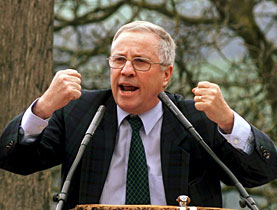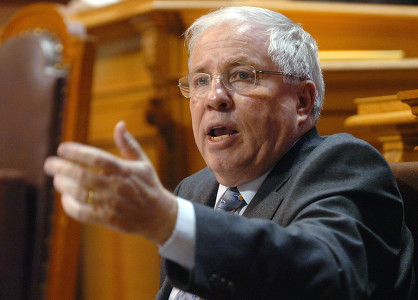Cabinet elections cause political shake-up

Parliament's refusal to re-elect the controversial rightwing cabinet minister, Christoph Blocher, has caused shockwaves in the Swiss political world.
The big question is now whether the wildcard candidate from Blocher’s own party who was elected to cabinet instead will take on the job. Eveline Widmer-Schlumpf will announce her decision on Thursday.
Widmer-Schlumpf, a member of a cantonal government, but not a member of the federal parliament, asked for time to ponder her next move. The rightwing Swiss People’s Party politician is considered more moderate than party leading light Blocher.
She won by a margin of ten votes after two rounds of voting in a joint session of the House of Representatives and the Senate on Wednesday, prompting a rare political shake-up.
The decision appeared to take most politicians and analysts by surprise. It could force the People’s Party into opposition if it makes good its threat to pull out of the government unless Blocher – the justice minister = is re-elected.
“Widmer-Schlumpf will have to take a very difficult decision, possibly against the intentions of her party,” said Andreas Ladner, a political scientist at the Lausanne Graduate Institute of Public Administration.
He added that a refusal to accept the appointment would leave the situation open – new candidates could emerge from within the People’s Party or the centre-right Christian Democrats.
For its part, the People’s Party leadership said on Wednesday that it would put forward Blocher again.
The surprise non-election is only the fourth such result in the history of modern-day Switzerland. In 2003 parliament ousted Christian Democrat and Justice Minister Ruth Metzler in favour of Blocher.
Backlash
Margret Kiener Nellen, of the centre-left Social Democratic Party, says Blocher and his party have paid the penalty for their arrogance and confrontational style of politics in the run-up to October’s parliamentary elections.
“Parliament was not ignoring voter’s intentions by ousting Blocher. We were also elected by the people and are free to make our own choice,” Kiener Nellen said.
The People’s Party won a record 29 per cent in elections to the House of Representatives – the best result for a political party in nearly 90 years. But it provoked anger with its staunch nationalist and anti-immigrant stance.
“For me democracy and more particularly women are the winners of the day,” Kiener Nellen added.
She hopes Widmer-Schlumpf will accept the seat but wonders whether Switzerland might not see history repeating itself.
“Two previous women cabinet ministers from centre-right parties either left the cabinet under a cloud or were voted out. What if Widmer-Schlumpf caves in under pressure from her party?”
Luc Recordon, who helped to launch the attack against Blocher, is highly pleased. He was the Green Party’s official challenger but later withdrew his candidacy for Widmer-Schlumpf.
“The main winners are democracy and Republican values more than one person,” he said.

More
Consensus politics and power-sharing
Reaction
Blocher supporters reacted with disappointment and outrage. “I’m extremely saddened and I felt like crying,” said parliamentarian Jasmin Hutter.
Others described events in parliament as a “scandal” and “disaster” for the country.
Some have criticised Widmer-Schlumpf for keeping Switzerland in suspense for a night.
The population has also been following the events avidly.
Several hundred people gathered outside the parliament building in the capital, Bern, on Wednesday to express their satisfaction with the outcome of the cabinet elections.
Opponents of Blocher have called on demonstrators to meet again on Thursday morning hoping to encourage Widmer-Schlumpf to accept her seat.
swissinfo, Urs Geiser

More
Government, ministers, president
The four main political parties have been represented in the seven-member Swiss government for nearly 50 years.
The party-political make up remained unchanged between 1959 and 2003, when Christoph Blocher won a second seat for his party at the expense of the centre-right Christian Democrats.
The four main parties have an 80% majority in parliament, while the Greens are the largest opposition party with around 10%.
Over the past 15 years the People’s Party has gradually increased its share of the vote to 29% in October’s parliamentary elections.
The Swiss parliament on Wednesday confirmed the other six incumbent cabinet ministers.
Interior Minister Pascal Couchepin was named Swiss president for 2008 – a rotating and largely ceremonial post.
Corina Casanova became the second woman to be elected as cabinet manager, officially known as Federal Chancellor, the highest-ranking public official in Switzerland.

In compliance with the JTI standards
More: SWI swissinfo.ch certified by the Journalism Trust Initiative


You can find an overview of ongoing debates with our journalists here. Please join us!
If you want to start a conversation about a topic raised in this article or want to report factual errors, email us at english@swissinfo.ch.